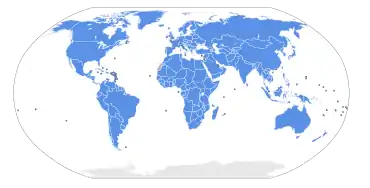Member states of the International Telecommunication Union
The International Telecommunication Union member states are the 193 sovereign states that are members of the International Telecommunication Union (ITU) and have equal representation at its supreme decision-making body, the ITU Plenipotentiary Conference. The ITU is the world's oldest intergovernmental organization having been founded in 1865.

Map of the International Telecommunication Union member states as of August 2019, with their territories (including dependent territories) recognized by the ITU in blue.
References
- Notes
- Benin: Name was changed from Dahomey on 1 December 1975.
- Plurinational State of Bolivia: Previously referred to as Bolivia.
- Burkina Faso: Name was changed from Upper Volta on 6 August 1984.
- Cabo Verde: Previously referred to as Cape Verde. On 24 October 2013, Cabo Verde requested that its name no longer be translated into different languages.[2]
- Cambodia: Name was changed to the Khmer Republic on 7 October 1970, and back to Cambodia on 30 April 1975. Name was changed again to Democratic Kampuchea on 6 April 1976, and back to Cambodia on 3 February 1990.
- Cameroon: Previously referred to as Cameroun (before merging with Southern Cameroons in 1961). By a letter of 4 January 1974, the Secretary-General was informed that Cameroon had changed its name to the United Republic of Cameroon. Name was changed back to Cameroon on 4 February 1984.
- Central African Republic: By a letter of 20 December 1976, the Central African Republic advised that it had changed its name to the Central African Empire. Name was changed back to the Central African Republic on 20 September 1979.
- Congo: Previously referred to as Congo (Brazzaville) (to differentiate it from Congo (Leopoldville)) and the People's Republic of the Congo. Name was changed to Congo on 15 November 1971 (after the Democratic Republic of the Congo changed its name to Zaire). Also referred to as Congo (Republic of the).
- Côte d'Ivoire: Previously referred to as Ivory Coast. On 6 November 1985, Côte d'Ivoire requested that its name no longer be translated into different languages; this became fully effective on 1 January 1986.
- Democratic Republic of the Congo: Previously referred to as Congo (Leopoldville) (to differentiate it from Congo (Brazzaville)). Name was changed from the Democratic Republic of the Congo to Zaire on 27 October 1971, and back to the Democratic Republic of the Congo on 17 May 1997.
- Eswatini: Name was changed from Swaziland on 19 April 2018.
- Republic of The Gambia: Previously referred to as The Gambia.
- Withdrew from the UN on 20 January 1965. It rejoined on 28 September 1966.
- Islamic Republic of Iran: Previously referred to as Iran. By a communication of 5 March 1981, Iran informed the Secretary-General that it should be referred to by its complete name of the Islamic Republic of Iran.
- Kazakhstan: Spelling was changed from Kazakstan on 20 June 1997.
- Lao People's Democratic Republic: Name was changed from Laos on 2 December 1975.
- Libya: Formerly recognised as the Libyan Arab Republic from 1969 after originally being admitted as Libya. By notes verbales of 1 and 21 April 1977, the Libyan Arab Republic advised that it had changed its name to the Libyan Arab Jamahiriya. On 16 September 2011, the UN General Assembly awarded the UN seat to the National Transitional Council, thereby restoring the original name of Libya.
- Madagascar: Previously referred to as the Malagasy Republic.
- Maldives: Previously referred to as the Maldive Islands.
- Myanmar: Name was changed from Burma on 18 June 1989.
- North Macedonia: Originally admitted under the temporary UN designation The former Yugoslav Republic of Macedonia.
- Philippines: Previously referred to as the Philippine Commonwealth (before becoming a republic in 1946) and as the Philippine Republic.
- Republic of Moldova: Previously referred to as Moldova.
- Saint Kitts and Nevis: Name was changed officially from Saint Christopher and Nevis on 26 November 1986; the UN, however, continued to use the former name throughout the year.
- Sao Tome and Principe: The official UN designation lacks diacritics; however, the name is constitutionally defined as São Tomé and Príncipe, with diacritics.
- South Africa: Previously referred to as the Union of South Africa (before becoming a republic in 1961).
- Sri Lanka: Name was changed from Ceylon on 22 May 1972.
- Suriname: Name was changed from Surinam on 23 January 1978.
- Thailand: Previously referred to as Siam.
- Bolivarian Republic of Venezuela: Previously referred to as Venezuela.
- Citations
- "List of ITU Member States". International Telecommunications Union. Retrieved 2019-08-13.
- "Change of name – Cape Verde" (PDF). United Nations. 29 October 2013. Archived from the original (PDF) on 2 January 2014. Retrieved 2 January 2014.
- Lederer, Edith M. (16 September 2011). "UN approves Libya seat for former rebels". Associated Press. Retrieved 16 September 2011.
This article is issued from Wikipedia. The text is licensed under Creative Commons - Attribution - Sharealike. Additional terms may apply for the media files.